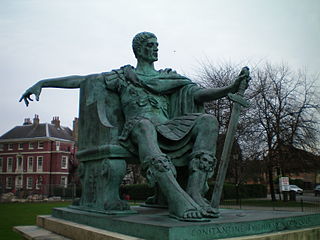The first name Konstantin is a derivation from the Latin name Constantinus (Constantine) in some European languages, such as Greek, Russian, Estonian and German. As a Christian given name, it refers to the memory of the Roman emperor Constantine the Great. A number of notable persons in the Byzantine Empire, and in Russian history and earlier East Slavic history are often referred to by this name.
Slobodan is a Serbo-Croatian masculine given name which means "free" used among other South Slavs as well. It was coined by Serbian liberal politician Vladimir Jovanović who, inspired by John Stuart Mill's essay On Liberty baptised his son as Slobodan in 1869 and his daughter Pravda (Justice) in 1871. It became popular in both the Kingdom of Yugoslavia (1918–1945) and the Socialist Federal Republic of Yugoslavia (1945–1991) among various ethnic groups within Yugoslavia and therefore today there are also Slobodans among Croats, Slovenes and other Yugoslav peoples.
Bojan is a Slavic given name, derived from the Slavic noun boj "battle." The ending -an is a suffix frequently found in anthroponyms of Slavic origin. The feminine variant is Bojana. The name is recorded in historical sources among Serbs, Bulgarians, Czechs, Poles, Croats, Slovenians, Macedonians, Ukrainians and Russians. In Slovenia, it is the 18th most popular name for males, as of 2010.
Stevo is a masculine given name and nickname, and a surname.
Zoran is a common South Slavic name, the masculine form of Zora, which means dawn, daybreak. The name is especially common in Serbia, North Macedonia, Croatia and a little in Slovenia.
Jovan is a Serbian male given name equivalent to English "John" or Slavic "Ivan", from Hebrew: יהוחנן. The name is common amongst Orthodox Christians as a result of John the baptist
Konstantinos or Constantinos is a Greek male given name.
Janković is a Serbo-Croatian surname, a patronymic derived from Janko. It is found in Serbia, Croatia, Bosnia and Herzegovina and Montenegro. Notable people with the surname include:
Greeks in Serbia number 690 people according to the 2022 census, and they are recognized as a national minority by the Serbian government. Many of them are not in the census because it was difficult to them reach the administration.An estimation by the Association of Greeks in Serbia has the number of Serbs of Greek descent at 4,500 people. They are mostly concentrated in four Serbian cities: Belgrade, Smederevo, Niš and Novi Sad. Greek presence is also recorded in Sombor, Pančevo, Subotica, Kragujevac, Požarevac, Bor, Bački Petrovac and Zrenjanin. Many Greeks added the Slavic ending "ić", "ski" or "ev" to their surnames as an assimilation process in SFR Yugoslavia. The first association of Greeks in Serbia was formed in 1923 under the name "Riga od Fere". The first Serb-Greek friendship society was formed in 1934 by Pavle Karađorđević, the friendship society now has over 2,500 members in Serbia.

Rudolph or Rudolf or Rodolphe is a male first name, and, less commonly, a surname. It is an ancient Germanic name deriving from two stems: Hrōþi, Hruod, Hróðr or Hrōð, meaning "fame", "glory" "honour", "renown", and olf meaning "wolf" (Hrōþiwulfaz).
Božidar is a Slavic given name meaning "Divine gift". It is a calque of the Greek name Theodore, itself derived from the Greek word "Theodoros". Božo is a nickname form of Božidar. People with the name include:
Miodrag is a South Slavonic, for all purposes almost exclusively Serbian, masculine given name, derived from mio and drag, both common in Slavonic dithematic names. It may refer to:

Constantine is a masculine and feminine given name and surname which is derived from the Latin name Constantinus, a hypocoristic of the first names Constans and Constantius, both meaning "constant, steadfast" in Latin. The popularity stems from the eleven Roman and Byzantine emperors, beginning with St. Constantine I.
Dragan is a popular Serbo-Croatian masculine given name derived from the common Slavic element drag meaning "dear, beloved". The feminine form is Dragana.
Tomašević, Tomasevic or Tomasevich is a Slavic patronymic surname, equivalent to Thomson or Thompson. Notable people with the surname include:
Savić, Sawicz, Савич, Савiч, Savic, Savich or Savitch is a Slavic surname, sometimes used as a first name, most common among South Slavs. It can be related to the name Sava or Sava (river).
Vasil is a Bulgarian, Macedonian and Georgian masculine given name. It may refer to:
Kostantin "Kosta" Alković was a physicist, professor of physics and mechanics from 1863 to 1892 at the Belgrade College, state advisor and minister of construction. He was also a member of the Serbian Academy of Arts and Sciences
This page is based on this
Wikipedia article Text is available under the
CC BY-SA 4.0 license; additional terms may apply.
Images, videos and audio are available under their respective licenses.

